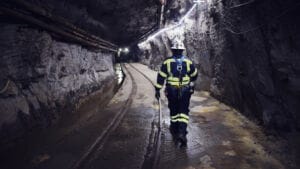The last time an Arizona politician stood at the threshold of the White House was 44 years ago, when Republican presidential nominee Barry Goldwater introduced a new form of conservative politics to America before falling under the wheels of President Lyndon Baines Johnson’s campaign juggernaut.
Now, another Arizonan, also the Republican nominee, has the White House within his grasp.
Within weeks, Sen. John McCain will either make history or repeat it in one of the most closely watched presidential elections in modern history as he squares off against Sen. Barack Obama, the first African-American presidential nominee of either major party.
“I don’t seek the office out of a sense of entitlement. I owe America more than she has ever owed me,” McCain says. “Thirty-five
years ago, I came home from an extended leave abroad. While I was away, I fell in love with my country. I have been an imperfect servant of my country ever since, in uniform and in office, in war and peace.”
That he has made it this far is remarkable considering his campaign seemed on the verge of collapsing in the months before the Iowa caucus.
McCain had trouble getting his primary campaign off the ground. Then, after securing the Republican nomination, McCain’s campaign began to drift, says Larry Sabato, a nationally recognized political science professor at the University of Virginia.
“He was the nominee for the Republican Party long before Obama had the Democratic bid, but he didn’t seem to use that time wisely,” Sabato says.
However, Sabato believes McCain’s campaign has since tightened up considerably.
“They are making decisions quickly and rolling the dice as needed,” he says.
Deeply involved in politics since leaving the U.S. Navy in 1981, McCain was first elected into the U.S. House of Representatives in 1982. He was elected into the U.S. Senate in 1986. When he was reelected for his third Senate term in 2004, McCain won by an overwhelming percentage of the vote.
In between, McCain ran for president for the first time in 2000, hoping to ride his Straight Talk Express campaign bus all the way to the White House. An underdog, he surprised supposed frontrunner Texas Gov. George W. Bush by winning the New Hampshire GOP primary. That’s when the campaign turned ugly, and in the South Carolina primary, very personal. Bush, of course, eventually won the Republican nomination and the general election.
Over the past eight years, McCain has clashed with Bush on numerous issues, but he has remained unwaveringly behind Bush on the Iraq War, telling radio talk show host Mike Gallagher earlier this year, “No one has supported President Bush on Iraq more than I have.”
McCain went on to add, “… there are many national security issues that I have strongly supported the president (on) and steadfastly so.”
Bush in turn has expressed his support for McCain’s 2008 presidential bid, giving his endorsement earlier this year and saying that McCain has the “character, courage and perseverance” to lead the country, according to an article on CNNPolitics.com.
Even Paul Johnson, the former Phoenix mayor who at one time expressed concern about McCain’s famous temper, believes the senator is maintaining a solid campaign.
“I am proud of the way he is running his campaign and the issues he’s bringing to the forefront,” Johnson says.
Besides taking flak for his temper, McCain has also been taken to task for breaking from the Republican Party on some high-profile votes, and even for his age; at 72, he would be the oldest president in U.S. history, if elected. But countering that is the fact McCain is also a respected war hero.
McCain spent five and a half years as a prisoner of war during the Vietnam War in the infamous camp dubbed the “Hanoi Hilton,” where he was forced into solitary confinement, denied medical treatment and beaten by the North Vietnamese. But he maintains he is not bitter — rather he is humble.
“There is no higher honor than sacrificing for a cause greater than my own self-interest,” he says.
He also believes this experience, as well as his leadership in the Senate Armed Services Committee, makes him the most-qualified candidate to be commander in chief.
McCain’s domestic platform for his potential presidency begins with a goal to present greater opportunity and prosperity for workers and their families.
“That agenda will ensure those workers are employed by businesses that invest in innovative technologies, are not strangled by excessive regulation, are not burdened by high taxes, do not face rising health costs that squeeze wages, and sell more products and services in world markets,” he says.
On the foreign policy front, McCain has made no secret of his support of the war in Iraq, but he admits, “I do not want to keep our troops there a minute longer than necessary to secure our interests. And I believe we can achieve that goal, perhaps sooner than many imagine, and must give Gen. (David) Petraeus and our troops the necessary time to succeed in Iraq.”
He adds that if elected president, he will ensure “al-Qaeda has no safe haven anywhere in the world, including Afghanistan, where U.S. and NATO forces continue to root out and eliminate the threat of remnants of the Taliban and al-Qaeda.”
McCain promises that with him at the helm, American families will be secure from threats domestic and foreign. “I will take on our damaging dependence on imported oil and make sure that oil will never again be a weapon against us,” he says. “America’s workers will be secure in the fact that they have portable health insurance and pension benefits, allowing them to move from job-to-job, job-to-home, and job-to-retirement without fear of losing their financial safety net.
“They will be secure in the knowledge that if the economic foundation of their employer or industry shifts, they will be prepared to make the transition to a new job and have access to community college-based training programs that provide the skills to acquire and hold a better job for the 21st century.”
McCain does not deny that there are major economic challenges that must be confronted and he has plans to amend these crises. “Americans are suffering under high gasoline prices, rising food prices, a housing crisis, and tough credit conditions that threaten even the ability of our students to get their college loans,” he says.
As part of McCain’s approach to ease consumers’ current pain, he pushed for a summer gas tax holiday and to stop filling the Strategic Petroleum Reserve. He has also proposed his so-called HOME Plan to provide robust, timely and targeted help to those hurt by the housing crisis. In addition, he called for a Justice Department task force to investigate wrongdoing in the mortgage industry.
To ensure that college remains a reality, McCain has proposed a student loan continuity plan that will coordinate policies with the states to keep the credit crunch from hurting students.
McCain also promises to address the challenge of rising health care costs by “transforming the health care system to focus on quality, cost, and being responsive to the needs of American families.” He adds: “Furthermore, I will not leave difficult tasks like securing our border, entitlement reform, or fixing our schools for another generation of leaders to solve.”
McCain has lofty goals for the future and security of America and its people. But he has one major obstacle standing between himself and the White House. In the minds of many Americans, the sheer fact that McCain would be replacing another Republican — and a highly unpopular one at that — is a detriment to his campaign, according to Patrick Kenney, professor and chair of Arizona State University’s political science department.
“The Republicans have been in power since 2001 and ‘peace and prosperity’ is not going well,” Kenney says. “The economy is down, the war is not entirely supported and (McCain) is linked to Bush’s war and economic program.”
For his part, Obama is hoping the link to Bush will work in his favor. He released a television spot in late July titled “The Low Road,” in which, The Huffington Post reports, “the Illinois Democrat (is) playing his trump card: tying McCain to George W. Bush, both in politics and in policy.”
However, Arizona’s other senator, Jon Kyl, believes McCain’s connection to Bush and the war has a positive side. “He was instrumental in helping Bush with the surge strategy after he returned from Iraq and saw first-hand the things that weren’t being done properly to win the war,” Kyl says.
It is this military expertise and experience that Kyl believes will help McCain gain support from veterans.
“I think that all Americans appreciate his service and it will help prepare him to make decisions and winning strategies in the war,” Kyle says. “It helps identify him with leadership, experience, courage and independence.”

Grant Woods, the former Arizona attorney general from 1991-1999, thinks it is that very independence that makes McCain the ideal man to lead the nation. “He will never be a scripted, always ‘on’ message candidate,” Woods says. “This is frustrating to the professionals, but makes him more attractive to real people because he is a real guy.
“We face great international challenges militarily and economically,” Woods continues. “I believe his lifetime of service gives him the judgment we need to lead the country at this time. He has the experience to make his own decisions.”
As Election Day draws near, Americans will be responsible for making their own decisions, as well. Regardless of the outcome, change is on the horizon — and that is exactly what the American people seem to want for the future.




